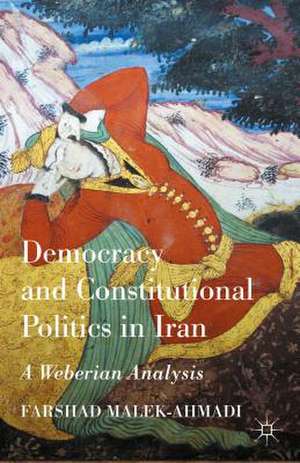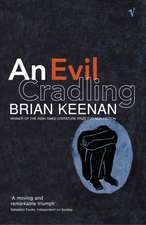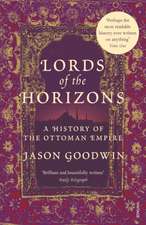Democracy and Constitutional Politics in Iran: A Weberian Analysis
Autor Farshad Malek-Ahmadien Limba Engleză Hardback – 29 sep 2015
Preț: 421.55 lei
Nou
Puncte Express: 632
Preț estimativ în valută:
80.66€ • 87.89$ • 67.97£
80.66€ • 87.89$ • 67.97£
Carte tipărită la comandă
Livrare economică 23 aprilie-07 mai
Preluare comenzi: 021 569.72.76
Specificații
ISBN-13: 9781137429131
ISBN-10: 1137429135
Pagini: 221
Ilustrații: XIV, 221 p.
Dimensiuni: 140 x 216 x 14 mm
Greutate: 0.42 kg
Ediția:1st ed. 2015
Editura: Palgrave Macmillan US
Colecția Palgrave Macmillan
Locul publicării:New York, United States
ISBN-10: 1137429135
Pagini: 221
Ilustrații: XIV, 221 p.
Dimensiuni: 140 x 216 x 14 mm
Greutate: 0.42 kg
Ediția:1st ed. 2015
Editura: Palgrave Macmillan US
Colecția Palgrave Macmillan
Locul publicării:New York, United States
Cuprins
1. Introduction
2. Theoretical Framework
3. Structure of Domination if Pre-Modern Iran
4. Modernization of the State
5. Constitutional Revolution of Iran 1905-1911
6. Article 2 of the Supplement to Fundamental Law and the Constitutional Politics of Transition to Parliamentary Legislation
7. Clerical Control of the State: The Council of Guardians
8. Constitutional Crisis of the State: Revision and Confirmatory Supervision
9. Constitutional Politics of Political Parties and Institutions
10. Continuing Constitutional Crisis and Revision
11. Khatami Era and the Green Movement
12. Linkages Between Two Clerical Supervisions of the State and Other Relevant Issues
13. Women's Movement, Gender Equality, and Democratization
14. Democratization and Its Impediments in Iran
15. Conclusion
2. Theoretical Framework
3. Structure of Domination if Pre-Modern Iran
4. Modernization of the State
5. Constitutional Revolution of Iran 1905-1911
6. Article 2 of the Supplement to Fundamental Law and the Constitutional Politics of Transition to Parliamentary Legislation
7. Clerical Control of the State: The Council of Guardians
8. Constitutional Crisis of the State: Revision and Confirmatory Supervision
9. Constitutional Politics of Political Parties and Institutions
10. Continuing Constitutional Crisis and Revision
11. Khatami Era and the Green Movement
12. Linkages Between Two Clerical Supervisions of the State and Other Relevant Issues
13. Women's Movement, Gender Equality, and Democratization
14. Democratization and Its Impediments in Iran
15. Conclusion
Recenzii
"If you ever wondered why a century past her Constitutional Revolution of 1905-1911 Iran is still struggling to establish a democratic order and sustainable constitutional politics, you should read Malek-Ahmadi's account of the contestation of liberal and authoritarian interpretations of the law and religion among Iranian political elites, especially as it has manifested itself in the rule of the Islamic Republic in Iran." - Ali Akbar Mahdi, Ali Akbar Mahdi, Lecturer in Sociology, California State University, College of the Canyons, USA
"A careful and sophisticated account of Iran's bumpy road to democratization in historical perspective and cast in an analytical framework drawn from Max Weber. Malek-Ahmadi presents Iran's unique constitutional experience in a new light." - Said Amir Arjomand, Distinguished Service Professor of Sociology, State University of New York, Stony Brook, USA
"Farshad Malek-Ahmadi captures the tension between democratic and autocratic tendencies in Iranian politics and the power wielded by Shiite clerics over government policies that long predates the 1979 Islamic Revolution. Iran's ultimate modernization, he suggests, depends on a separation of mosque and state that may take another generation or more to achieve." - Barbara Slavin, Author of Bitter Friends, Bosom Enemies: Iran, the U.S., and the Twisted Path to Confrontation (2009)
"Relying on Max Weber's discussion of different types of authority, Farshad Malek-Ahmadi deftly lays out the interplay of the historical yearning for constitutionalism in Iran and the repeated hurdles to this quest for representation and rule of law. Despite delineation of repeated institutional failures, Malek-Ahmadi's conclusion about the strength of the yearning for constitutionalism is both refreshing and hopeful." - Farideh Farhi, Independent Scholar and Affiliate Graduate Faculty at the University of Hawai'i at Manoa, USA
"The history of twentieth-century Iran is bracketed by two experiments in constitutional design, the Constitutional Revolution of 1906-1907 and the Islamic Republic, which was established in 1979. Farshad Malek-Ahmadi's erudite book contrasts these episodes and explores their implications for the ongoing tension between clerical authorities and the emerging modern state in Iran, using the classic conceptual framework of the great German sociologist Max Weber." - Charles Kurzman, Professor of Sociology, University of North Carolina at Chapel Hill, USA
"A careful and sophisticated account of Iran's bumpy road to democratization in historical perspective and cast in an analytical framework drawn from Max Weber. Malek-Ahmadi presents Iran's unique constitutional experience in a new light." - Said Amir Arjomand, Distinguished Service Professor of Sociology, State University of New York, Stony Brook, USA
"Farshad Malek-Ahmadi captures the tension between democratic and autocratic tendencies in Iranian politics and the power wielded by Shiite clerics over government policies that long predates the 1979 Islamic Revolution. Iran's ultimate modernization, he suggests, depends on a separation of mosque and state that may take another generation or more to achieve." - Barbara Slavin, Author of Bitter Friends, Bosom Enemies: Iran, the U.S., and the Twisted Path to Confrontation (2009)
"Relying on Max Weber's discussion of different types of authority, Farshad Malek-Ahmadi deftly lays out the interplay of the historical yearning for constitutionalism in Iran and the repeated hurdles to this quest for representation and rule of law. Despite delineation of repeated institutional failures, Malek-Ahmadi's conclusion about the strength of the yearning for constitutionalism is both refreshing and hopeful." - Farideh Farhi, Independent Scholar and Affiliate Graduate Faculty at the University of Hawai'i at Manoa, USA
"The history of twentieth-century Iran is bracketed by two experiments in constitutional design, the Constitutional Revolution of 1906-1907 and the Islamic Republic, which was established in 1979. Farshad Malek-Ahmadi's erudite book contrasts these episodes and explores their implications for the ongoing tension between clerical authorities and the emerging modern state in Iran, using the classic conceptual framework of the great German sociologist Max Weber." - Charles Kurzman, Professor of Sociology, University of North Carolina at Chapel Hill, USA
Notă biografică
Farshad Malek-Ahmadi received his PhD in Sociology from the State University of New York at Stony Brook in 1999. Since 2004, he has been teaching at Naugatuck Valley Community College, USA. For twenty years, he has taught sociology classes at academic institutions both in the United States and abroad. His research interests are in the areas of politics, law, and literature.



















